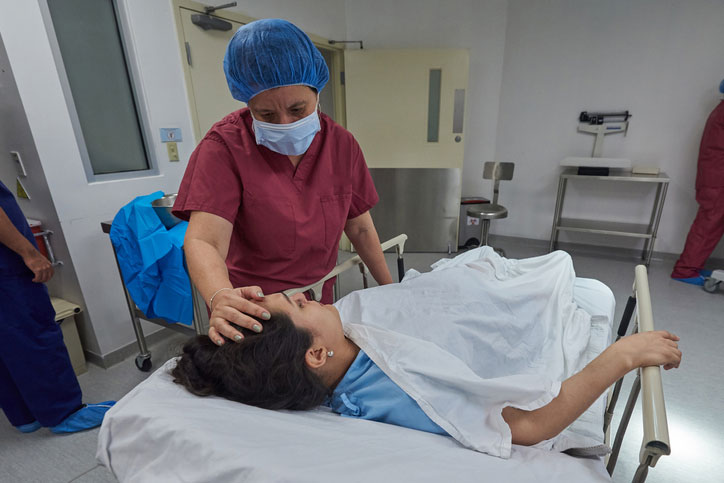Reviewed by Abbie Jacobs, RN, BSN
If you started the year studying for a Doctor of Nursing Practice degree, that coursework is probably the last thing on your mind right now. Many schools have closed their campuses and transitioned to online courses for the duration of the COVID-19 pandemic response. The few states where shutdowns aren’t yet in place will likely see them coming soon. Students all across the country are scrambling to adjust to remote classes for the first time. But for you, a licensed RN, it’s different.
Tomorrow, you hope to hold a terminal degree in advanced practice nursing. You’ll have the tools and knowledge to practice at the top of the profession, to be a leader and specialist in your field. You’ll have the skills and experience to make a meaningful impact on the state of healthcare in your practice area that could improve the delivery of care in your community and beyond.
Today, though, as COVID-19 infected patients come streaming into ERs around the country, you’re being called in to an urgent and unprecedented situation where lives hang in the balance. Hospitals around the country are desperate for nurses. ICU beds are close to maxing out in a dozen states, and may well be overflowing in every state within the next month. Front-line healthcare professionals are battling burnout. Many hospitals are running shorthanded as exposed clinicians are falling sick themselves or being quarantined. Every single nurse matters right now.
Depending on your personal situation, experience, and college, it may be a difficult choice to have to make between continuing your classes or donning full PPE and entering the fight… Or, as someone who became a nurse in the first place to save lives, it may be no choice at all.
While most of the world is swept up in events beyond our control, your chosen profession offers you the gift of action in a time when most of us are helpless… whether you choose to care for those stricken by COVID-19 today, or continue your education for the benefit of the patients of tomorrow.
- COVID-19 Forces Difficult Choices On Both Students and Colleges
- Schools Are Moving DNP Classes Online
- Coping with A Sudden Shift When Your DNP Curriculum Goes 100% Online
- Managing Healthcare Education During a Crisis
COVID-19 Forces Difficult Choices On Both Students and Colleges

Of course, you’re not in this alone. Across the country, medical professionals are making tough calls about their families, work, and education. Nursing schools are facing some hard decisions about how to proceed with DNP programs, and their students are too.
In hard-hit areas, schools are already making their appeal, turning to both students and faculty join the fight in local hospitals. Some 300 faculty and staff volunteers from Yale’s School of Nursing have already stepped up to augment the surge-capacity at area hospitals. Some states, including Wisconsin, are expediting the nursing licensure process for advanced practitioners and removing collaborative practice requirements as a way to remove restrictions and eliminate delays.
Most DNP students already hold nursing credentials, and many choose to study for their DNP while continuing to work in the profession. You’re probably already seeing half or more of your classmates out in the ERs and clinics being overwhelmed by the onslaught of coronavirus cases. And as demand for nurses skyrockets, you may be feeling a lot of pressure to drop your studies and temporarily return to help out.
You are at a crossroads not just in your education, but in your life.
Schools Are Moving DNP Classes Online, But Programs May Effectively Be on Hold for Now

One of the most sobering facts about the COVID-19 outbreak is that, as bad as it is, we may still be in the early days of it all. That means making crucial decisions based on incomplete information, and those decisions may not stand for long. Programs that are forging ahead today may shut their doors before the end of the semester.
Aside from the question of whether or not you should put school on hold to return full-time to the workforce during the emergency, you can’t even be sure now if the resources are there to satisfy graduation requirements.
Most Clinical Placements Are Being Cancelled
Like all nursing degrees, DNP programs typically include both traditional coursework and significant clinical hours in active clinical programs.
Many schools have already bowed to pressure on their faculty, students, and placement sites, completely suspending clinicals without prejudice for the duration of the crisis. Even if you are using your current nursing position as your clinical placement, preceptors and faculty lack the capacity to supervise so most of those hours can’t be used to fulfill graduation or licensing requirements anyway. In other cases, decisions are being left to placement sites and individual students about the possibility of continuing current clinical assignments.
Just as the virus has not hit all areas of the country with equal force, not all DNP programs are feeling the same impact. Some are continuing clinical placements with only slight modifications.
Depending on the options your college is offering and the structure of the program, you may have little choice but to put your DNP on hold if your clinical is cancelled. Many programs place the clinical toward the end of your studies, when your regular classwork has already been completed, so even if classes are still offered, it may do you little good since you still won’t be able to complete your program on schedule.
Most Classwork Is Continuing In An Online Format
At the same time, classes that can be conducted online are being moved to that format.
Considering how many instructors and students remain actively in practice, and are volunteering for front-line work treating patients during the crisis, it’s an open question how long those classes will continue. So you have to consider not just your personal decision about going forward with your studies, but also the likelihood that they will continue in the weeks ahead.
In the meantime, there are schools that are attempting to accommodate students who wish to continue their coursework, using virtual learning environments and tossing out certain coursework requirements to keep you on your path to a DNP. These adaptations are not just school dependent, but also rely on state board of nursing guidance, so they can vary widely from school to school. In California, for instance, the Board of Registered Nursing is considering allowing more clinical rotations to be satisfied using virtual simulations.
If you plan to continue your studies, and assuming you’re even able to, you’ll have to make some adjustments to make the transition to online courses only.
Coping with A Sudden Shift When Your DNP Curriculum Goes 100% Online Overnight

Almost all schools that offer a DNP already have some form of online education, which means they are better prepared for this transition than most. They have well-equipped IT departments, well-developed instructor guidelines, and digital curriculums in place.
If it seems daunting, don’t worry; thousands of DNP students have managed to learn all the critical skills of the profession through these platforms. In fact, you might come to appreciate the advantages of having flexibility and the built-in tools that come with online learning over regular campus-based classes.
It will still take some effort on your end, and probably some patience as strained systems are patched up to meet the sudden spike in demand.
Learning Management Systems Offer Structure and Communications for Classes
The heavy lifting in online classes typically happens through the Learning Management Systems (LMS) virtually every nursing school in the country has in place these days. These web-based programs manage course delivery, student access to course materials, communication between instructors and peers, portals for submitting assignments, testing platforms, and everything else you might need to complete your DNP program:
- Video and audio streams
- Assignment tracking
- Homework uploads
- Instructor and student conferencing and chat
- Online material access
Some of the popular LMS platforms that many nursing schools use include:
You’ll need a login from your school IT department. Many systems come with a self-service helpdesk built in, so instructions should be easy to find.
What Sort of Hardware and Software Will You Need for Online Classes?
Almost all LMS systems work through a basic web-browser in any Windows or Mac computer made within the past decade or so—this year’s hottest new PC is not required. Many also offer apps that can work directly with your phone or mobile device, even if you don’t have a full-fledged computer at home.
Some schools are starting loaner programs for computer hardware for students without the right equipment, and many colleges have arrangements for low-cost hardware purchases through the campus bookstore.
You’ll also need an internet connection. Because video conferencing is often necessary, your bandwidth at home can be a limiting factor. But, again, schools are aware of these limitations and are also working to help out. Some offer cellular WIFI hotspots for students without internet, while others are even boosting WIFI signals to cover parking lots, so students can pull in and do classwork in their cars if they are unable to connect from home.
You may need some specialized software depending on the LMS capabilities and how your instructors choose to conduct classes. That might include apps you already have and use:
Managing Healthcare Education During a Crisis

The mechanics of online classes could prove to be the easiest part of the process, however. That doesn’t mean it will be easy; transitioning to online learning offers obstacles even during the best of times when it comes to staying motivated, focused and managing the technical aspects if that’s not your forte.
Many of the traditional ways to cope with these obstacles are off the table right now. Social distancing keeps you from getting out and working from a coffee shop for a few hours around people; it stops support and study groups; it keeps you out of libraries and labs when you need first-hand research resources.
On top of all that, there’s the normal anxiety and distraction that comes with working in the field at ground zero of a pandemic response.
But nurses are made of tough stuff, as we are seeing around the world every day now. The 300 volunteers at Yale, the classes of RNs graduating early and stepping into the miasma of the epidemic, the nurses improvising PPE from umbrellas and garbage bags… that’s the kind of grit you are bringing to this fight. And you’re not alone.
Schools Are Shifting Expectations and Making Accommodations
Colleges are stepping up to make your life easier too, with online support groups and relaxed requirements to help ease you through an unplanned online diversion. Like many others, your school may plan to offer:
- Assignment or course extensions
- Grading changes (allowing pass/fail for current courses)
- Shifting to greater reliance on virtual simulation
Your Coworkers and Fellow Students Are Solid Gold
These are the times you notice the quality of the people around you, and if you’re working or studying in healthcare, it’s already very clear: you’re surrounded by the best. Men and women who show up wearing garbage bags when protective clothing runs out, who have deep bruises on their faces from wearing masks and goggles for twelve and sixteen hours straight, who have to strip down and shower as soon as they get home to avoid exposing their families, but who still show up again eight hours later for the next shift… these are people who have your back, whether you are pulling an all-nighter in the ICU or a solo study session.
Don’t be afraid to reach out to them, and do your best to help them. Although you may already feel stretched to your limits, the research is solid; altruism is energizing.
The Country Is With You
Maybe it sounds trite when many nurses are scrambling to secure proper personal protective equipment, and when it seems like news story after news story is full of yahoos ignoring the social distancing rules that could make your job easier, but it’s true: medical professionals have never had more respect than right now.
If you aren’t in one of the cities where healthcare workers have been serenaded by nightly clapping sessions from secluded people from balconies and apartment windows, give your morale a boost with a few YouTube videos of New Yorkers showing their appreciation.
And if that doesn’t pick you up enough, consider the many hotel chains that are offering exhausted nurses free accommodations near hospitals, or restaurants, and coffee shops offering free meals and coffee. Your efforts are appreciated, in school, and on the job.
Don’t give up. We need you today… and tomorrow.









